#im talking MAJOR
Text
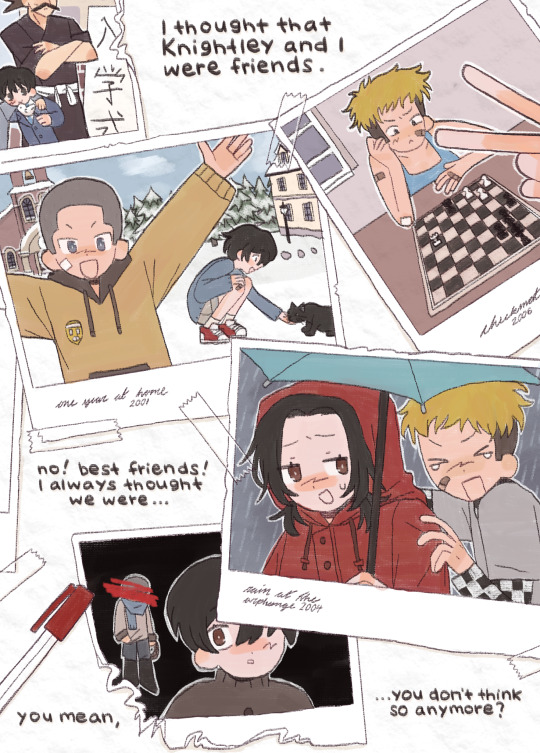
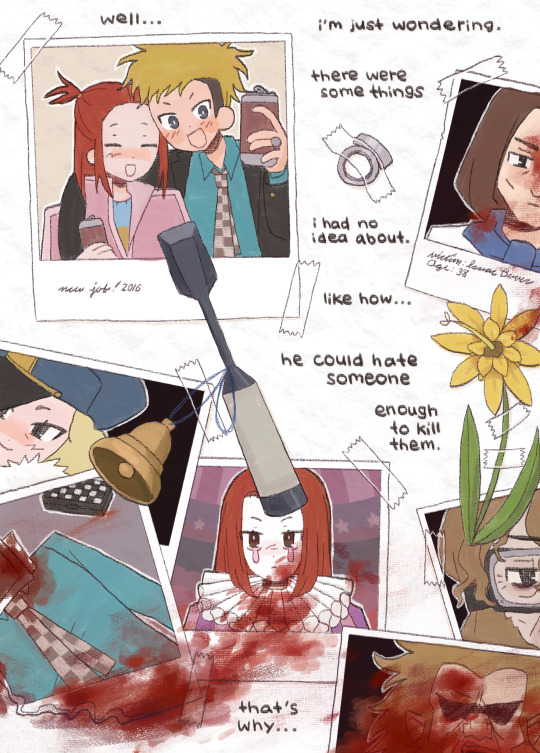

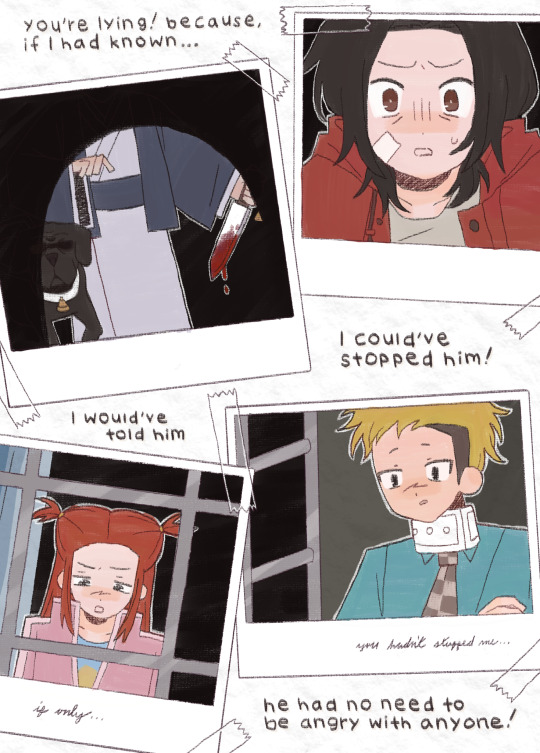
anyone else think about simon's case 2 dialogue about knightley thats definitely about more than just knightley? just me? ok
#this took sooo freaking long JUST TAKE IT#sorry i cant draw animals or middle aged men. everyone has a niche and mine is cute anime boys#aai2 spoilers#im talking MAJOR#.log#ace attorney#aai2#ace attorney investigations 2#simon keyes#horace knightley#sirhan dogen#isaac dover#patricia roland#blaise debeste#manosouta#its actually about himself. btw. and how he had no one he could really trust. anmd pushed away the one friend he had. In case anyone gaf#souta sarushiro#manosuke naitou#gk2#S#gyakuten kenji 2#art#i am never doing a long thing like this again#cw blood
128 notes
·
View notes
Text
theres literally a show with 30+ seasons of beautiful autistic men in power armor beating the shit out of each other and developing the most insane codependent gayer-than-being-gay relationships but only like ~50 people on this website post about it
#cro zone#im talking about kamen rider btw#each season is its own series. i recommend kamen rider build bc it is the objectively best one#some personal faves are also geats + w + i havent seen revice yet but gifsets are saying theres major gay women in it
499 notes
·
View notes
Text
I'm seeing everyone pointing out the possible issues with Epic the Musical's deviation from the original story of Circe and Odysseus, and as someone who's studied Ancient Greece/ancient Greek myths a bit, I wanted to say some stuff about it. This will be a bit of a long one, so apologies for my rambling!
Note that I'm not trying to shit on SA survivor's perspectives and (completely valid) arguments. I'm just trying to offer some context surrounding the original myth and how it fits (or rather, doesn't fit) with a modern audience. If I'm wrong with any of this, feel free to call me out! Criticize the shit out of me! I like learning about Greek culture and myths and would 100% love to hear other perspectives on this.
So, a few points about Ancient Greek myths to kind of explain the context around Circe and Odysseus:
Greek myths generally did not have good views/depictions of women. Women were almost always depicted as conniving, selfish, sexually insatiable creatures. To largely summarize the process within actual Greek society, women had three/four stages in their life: child, dangerous/wild virgin (after first menstruation), married woman (whose wildness was tamed by her husband), and then a "real" woman (a mother). There are a few deviations from the "evil" trope, the most prominent of which being Penelope herself—she's basically the ideal Greek wife, staying loyal to her husband for 20 years and all that.
Adultery only applied to women. Husbands cheating on their wives wasn't merely tolerated, but expected. Marital sex wasn't seen as enjoyable, rather something that had to be done for the sake of reproduction and continuing the bloodline/securing inheritance. Men cheated on their wives with various kinds of prostitutes, concubines, mistresses, etc, but sleeping with unmarried women (that weren't specifically prostitutes) or married women was looked down upon. Women didn't have this same standard. They could only sleep with their husbands, hell, their husbands were pretty much the only men they could even interact with (excluding family, obviously).
The original myth has Hermes very plainly lay out how Odysseus' confrontation with Circe will go: Odysseus will eat the moly, draw his sword at her, she'll proposition him, and Hermes directly tells Odysseus to accept. Basically a "sleep with her if you want your men to live" situation. (See this post for more specifics on this).
So, let's apply this to Epic: The Musical. Here's some reasons I think may explain the Circe myth being changed:
The Greek "women being evil" stereotype is... problematic. While I 100% understand that it's important to acknowledge male victims of SA, I don't think the original myth was focusing on Odysseus being a victim—I saw it more of an emphasis on Circe being a sexually selfish woman, as all Greek women were believed to be. Changing Circe to be less conniving and evil deviates from the concerning Greek stereotype.
The SA in the myth is not actually very clearly SA. Yes, with a modern perspective, it absolutely is sexual coercion, but for Greeks, not so much. It made sense to them that sex could be transactional. It's already been established that Epic, while still generally accurate to the original myth, does change things relating to morality/themes in order to better align with modern Western ideas (i.e. OG Odysseus not being as remorseful and merciful, as that was expected of a Greek hero, but Epic Odysseus having more empathy because that's more modernly heroic). If something from the original myth doesn't translate well into modern culture, then it's understandable to want to change or omit it.
In the case that the original Circe myth wasn't SA (I'm not saying one is more right than the other, I'm just covering all the bases), then it wouldn't even constitute as cheating. Like I described earlier, it was perfectly acceptable and expected for men to sleep with women that weren't their wives. Plus, being a goddess, she's already kinda exempt from being blamed if Odysseus slept with her—only women are ever really blamed for sleeping with (or being SAed by) gods, and even then, their husbands sometimes don't even give a shit. But modernly, we would not see it that way. To us, it's not societally acceptable for a married man to sleep with another woman (without his wife's consent, at least). While Ancient Greeks viewed Odysseus as a good (or at least okay) husband, a modern audience wouldn't. Making Odysseus loyal to Penelope and not sleeping with other women (assuming this wasn't SA, but again that's one interpretation) makes him the good, loyal, empathic, modernly heroic man that Epic is clearly aiming for. Repeating my last point: If something from the original myth doesn't translate well into modern culture, then it's understandable to want to change or omit it.
Applying modern perspectives on Ancient Greek society and mythology isn't worth it. Like, we all joke about Ancient Greece being super gay, but they didn't actually like gay men. Homosexuality was literally only acceptable when it was between a young man and a prepubescent boy (it was called pederasty if you want to know more) or between women (they only considered penetrative sex to be 'real' sex so they didn't really care what women did with other women). Y'know the Hades and Persephone story? Like, the original one with the kidnapping? Yeah, that was normal. The myth of Demeter and Persephone is tragic, yes, but it was so normal that wedding ceremonies often included references/recreations of it! Girls got married off ASAP after their first menstruation to men of at least 30 years old. We don't tolerate that shit today (for the most part, at least)! But it was normal in Ancient Greece. Applying modern rules and standards to ancient culture just does not work.
Anyways, I'll shut up now! I'm gonna go keep listening to The Circe Saga lmao
EDIT: there is good criticism in the reblogs of this post that adds more perspective and corrects some of my generalizations/insights!!
#can you tell im a history major#seriously tho im not trying to shit on the opinions of SA survivors talking about this#the greeks were just kinda fucked up#greek mythology#epic the musical#odysseus#the odyssey#circe#circe saga#the circe saga#hermes#epic the circe saga#ancient greece#history
434 notes
·
View notes
Text
My coworker at my school is a compsci major and she doesn't know how to save a PDF 😭
#she literally just said ''im not a computer person...'' girl its ur MAJOR???#as a former cs major i was like ... girl....#i talk
680 notes
·
View notes
Text
you know, as an asexual who still enjoys viewing sexual content in like books fanfiction and films and things, it's all fun and games until I remember that people actually DO THOSE THINGS?? LIKE IN REAL LIFE?? REGULARLY??🧍🏻♂️like WHAT DO YOU MEAN SEX ISNT A FANFICTION TROPE??? 😭 crazy out here man
#i genuienly forget sex is like#a super duper important part of life to majority of the population#like what are you talking about#what do you mean#stahp#what do you mean people look at me weirdly when i say me and my fiance do not in fact have sex?!?!?#what do you mean that would be a deal breaker for you!??!?!?!!#what do you mean you actually go out and DO THESE THINGS IN REAL LIFE?!??!?!?!?#anywayz hope yall allosexuals are having fun i forget youre real <3#this is a light hearted post woo sex liberation woo yall are allowed to enjoy sex 🥳#and im allowed to enjoy sex by convincing myself its only inaginary <3#lmao#asexual#fanfiction#asexuality
298 notes
·
View notes
Text
"but hamas is getting funded by extremist islamic hate groups!" do you think the U.S. government and military giving funding for israeli's war efforts against palestinians is a morally neutral and inherently righteous body that had no influence in the politics of southwest asia as a global colonial superpower. do you really think anything you can say about the people resisting oppression can't be said about the oppressors.
#brieuc.txt#palestine#this isnt me justifying it but it is me pointing out the double standard how hamas' funding is antithetical to the freedom movement#but the u.s.' influence and financial support is completely fine and doesnt need to be brought up at all#''hamas doesnt have the best interests of palestinian people'' may be true but the alternative is not allowing an apartheid state to exist#also its a ridiculous thing to say because thats a common thing in most countries#neo-nazi groups r a major problem in the Ukraine military but nobody questions ukraine's right for freedom.#the double standards keep on piling up#im not saying you cant criticise these groups but is it criticism or is it propaganda#are you talking abt how war radicalises and changes n traumatises people or are you implying every palestinian is a dirty terrorist#etc#and do you understand that in an active war zone n worlds largest open air prison violence is guaranteed and is brutal.#or do you think that if the people with no electricity and water just Werent So Stubborn And Talked everything would be okay?#and do you consider white people fighting for freedom martyrs but brown people doing the same terrorists
737 notes
·
View notes
Text
its time for scp required reading... TWO!!!!!!!!!!!!!!!!
please for the love of god heed the fucking warnings im so serious . like as much as i want to keep the tone of this post jokey and funny you NEED to heed the warnings on these
ok with that out of the way. read about my blorbos boy
''incident 239-b clef-kondraki'' (general warning for violence and blood/gore) - this one fucks. thats all i have to say about it
''technical issues'' - this one's funny + im biased because i fucking love pat the tech guy
''routine psychological evaluations by doctor glass'' - again i have personal bias about this (<- simon glass enjoyer + host is a glass introj) + this ones funny + if you're more into the fanon versions of the foundation staff this is right up your alley
''tradition'' - halloween party fun :-)
''dr cimmerian hits reply all'' - this is exactly what it sounds like i don't now what to tell you
''stupid cupid / stupid cupid: stop picking on me!'' - my house my rules read about cimmerian and his boytoy
''hawaiian shirts'' - clef fucking Breaks. thats all i can say about this without exploding into viscera
''help me my (love for) my daughter was born too still'' (general warning for mentions of child death) - i have personal bias about this (<- #1 agatha rights enjoyer) but this tale is So Good in general and a super interesting look at how agatha perceives herself and her work/life balance
''so leave yourself alone.'' (warning for graphic depictions of vomit and attempted suicide) - REALLY really really good look at clef kind of dropping his cruel persona and iris' mental health struggles regarding the foundation
''yesterday'' (warning for violence and implied/reference suicide. kind of.) - :-( <- this is the only way i can express my emotions about this tale. anyway it's really good and an interesting way of showing clefs relationships with people
''an apple a day...'' - REALLY good look at how dr glass is as a person and how he acts with people + this entire tale fucks SEVERELY
''personal log of dr gears / personal log of █████ 'iceberg' ████'' - good example of how gears and iceberg both format their documents / how they speak + its vaguely gearsberg + this gives a look at how gears and iceberg met. read the gearsberg tale boy
''portraits of your father'' (warning for graphic alcoholism, suicide, survivors guilt, and blood/gore) - super good look at draven and his relationship with his father, and kondraki's alcoholism, and also talloran is there. also three cheers for dravoran
''life's cold'' - most normal day iceberg has at this fuckass foundation + this is a good look at how iceberg acts and thinks
''fond memories'' (warning for death and body horror) - draven proposes! Draven proposes.
''scp-3999'' (warning for bugs, paranoia, death, body horror, sexual assault/rape, unreality, self harm, and depictions of bodily mutilation) - unironically this one fucks me up so bad its so fucking good dude. go read about james talloran RIGHT NOW
''i stared into the face of everything and nothing and made it back alive'' - this one also fucks me up so bad like i dont even have anything to say. read about talloran and draven RIGHT NOW
''you are at the center of everything that happens to you'' - james talloran talks to himself. kind of.
''a suicide note'' (warning for mentions of rape, child murder, survivors guilt, and suicide) - interesting look at clefs thoughts on him and his work
''date night'' - objectum win! dr alto clef is objectoromantic AND objectosexual! <- that should tell you all you need to know about this one
''scp-4231 / montauk house'' (warnings for graphic depictions of sexual assault, rape, child abuse/neglect, murder, domestic violence, verbal/physical abuse and survivor's guilt) - absolutely gut-wrenching look at alto clef/francis wojciechoski and why he's so fucked up. uh genuinely do read the warnings on this one because when i say graphic i am not exaggerating. all of these things are explored in detail and are genuinely triggering so.
''okay, that's enough, let's get you home'' (warnings for some dubious make-out sessions, (mentioned) suicide, implications of rape/sexual assault, and vomit) - shameless moldhouse plug sorry not sorry. HIGHLY recommend reading this and it's other parts in their entirety because it genuinely drives me up the fucking wall it is So good. i will sing moldhouses praises until my throat goes out. read moldhouse Now
''duke 'till dawn'' - bpd king!!!!! anyway i dont have a lot of thoughts on this its just really good. also i didnt know dracula was an actual scp until i read this which is kind of funny to me
''rights' birthday party'' - my house my rules you're going to read about agatha rights whether you like it or not
''sex at a frigid temperature'' - again, my house my rules. read the depressing gearsberg tale, boy.
''7 things that new level 3 researchers should know'' - i dont have any thoughts on this i just think this one has really cool formatting
''home is where i want to be'' - no greater thoughts this is just really neat i think. also kiryu labs is in it and im biased as fuck
''gentle wings flutter quietly in the dark'' - read about zyn kiryu NOW
#[ren]#HHHHOLY FUCKKK. THIS TOOK ME SO LONG. AUUHGGH AUGHGHH AUUUGUHGHGH#please. please for the love of god reblog this im begging you#i did not put in all this goddamn work listing this shit for it to go unnoticed. coughing up blood#uhh. what else do i say.#honorable mentions to glass x diogenes 4ever! ; ship in a bottle ; and major tom which i left out. rest in pussy sweet princes#also if youre gonna ask ''wheres ___?'' the answer is probably either ''i dont like that one and therefore didnt include it'' or ''i have-#-literally never heard of that what the fuck are you talking about''#scp foundation#<- so i can find this later
181 notes
·
View notes
Text
There's a lot of validity in the idea that older Bakugo is a traumatized pro-hero with major PTSD... but you know what's kinda fucked up to think about? The fact that Bakugo is also a 22-year-old pro-hero with major PTSD even before that, too.
It's almost easy to imagine that things are actually better when he's older (the therapy finally a routine, the trauma long set and on the path to being healed)... and that it's his whole 20s that are spent as a pool of disaster trying to recover from the war(s).
He looks back and barely even remembers being twenty, much less twenty-five or twenty-seven. Barely remembers how little he slept, not at the hands of trying to balance hero work and getting a degree at the same time, but just out of the pure insomnia that came from trying to move on and every nightmare attached.
Hardly ever showering, never shaving (not that he ever grew much of a beard, but the facial hair was definitely there. There's pictures of him on the news with an awkward, grown out haircut and patches on facial hair that make him look positively... immature), barely even eating more than a few protein bars or an energy jelly drink-a day. It's a blur, and his friends are hardly there to pick him up out of it because they're all going through it, too. Somewhat.
It's definitely weird if you meet him during this period. He's not all there, at least, not all of the time. He doesn't really register your interactions, the friendship you extend to him (a younger, or ever older, version of him would've shown you that deep seeded ferocity in response, tried to bite the hand that fed him, even if it were love... but 20s Bakugo... doesn't seem to notice). Even though only one of his eyes is clouded over, the good one never seems to brighten up.
There's definitely moments when the old him shines through: when he's with Deku, when he's in the midst of battle, when he finds out that Todoroki still does a shitty job at chopping scallions. But it's a long time before he's even close to the same, able to step out from underneath the fog of simply surviving and into the sunshine of recovering.
But I think sticking through it with him is worth it.
(It's a weird moment, a happy moment, the first time you realize that Bakugo has changed. That the pouring rain outside hasn't bothered him since he showed up at your apartment. He forgot his umbrella, he's been quite careless ever since the war—wet and shaggy hair frizzed up, cheeks red from cold—but he doesn't seem to mind, with his bare feet up on your coffee table, his eyes gazing out the window. You hand his tea, and instead of gulping it down in one go, letting it burn in his throat, he winces at the heat.
"Tastes like shit," he says, and you laugh because it always does. Just this time, he noticed.)
#bakugou x reader#bakugo#this is what crocheting a baby hat does to u#no im jk i was just thinking abt bakugo being like 22 and awkward as h*ck bc he still hasnt recovered from the war#i wanna talk abt what he's like more but this is what came out instead LOL#like i think he's really stubborn abt ... coping with after effects of dying#and then before he knows it he has major depression LMFAOO#and he can like go to work get his degree do all he needs to do as a 20-something year guy#but he's not like. *there*. you know#and you meet him and he's a binch but he's not hard to get along with#and u just sorta take him in and drag him places like idk#your school's halloween night.. or even just a night out with ur friend (he doesn't even know how to order a drink)#and he doesnt even process it all until one day he's like 'dang it feels like ive been asleep for years'#and he kinda was#but he knows youre the one who helped him and now he wants to fix himself for you bc he remembers u being there for him#but he's so funny im imagining him with like. frat boy facial hair and a really outgrown ugly mullet type haircut#and lowkey with like. greasy skin (ik he's perfect but he's in a bad state and it shows) and he eats instant noodles ever day#and only watches japanese top gear#and goes on patrols where he beats the crap outta ppl and then doesnt remember it#DREAM BOY#and then he's big hero later#anyway#caitie post#gen
385 notes
·
View notes
Text
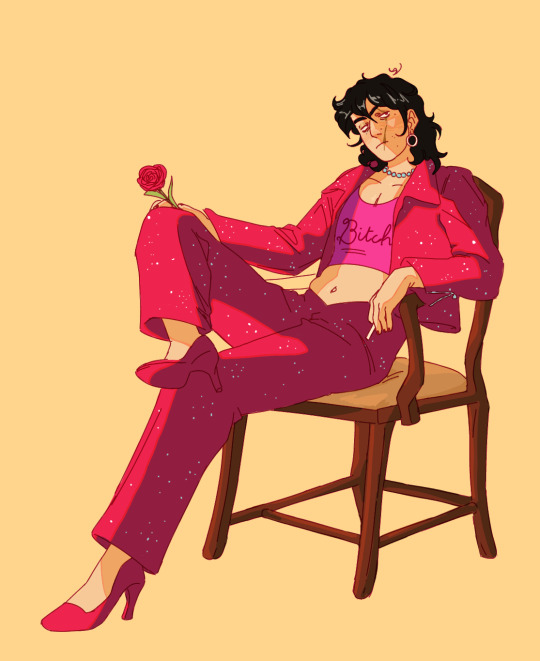
C!Q + vylette's fit from Jawbreaker
(aka an idea I've had for every conceivable holiday for months and decidedly couldn't put out on an appropriate date)
#i feel a little off posting this during such a time of distress but my own misery wont help others so I'm doing it anyway#also hi!!! I've been offline a lot but after much stress and a week being mildly mistreated at the hospital i finally know what's wrong!!#PM/SSc overlap syndrome you can look it up. they caught it early tho so none of my connective tissue is damaged#nor do i have any major systemic effects so yay. im taking meds for it and im praying for the best#anyway enough of my life hi folks this is the first thing ive drawn in MONTHS sry im rusty#sidenote in light of the tumblr panic never hesitate talking to me about anything I'd love it im just socially anxious#anyway i love yall hope yall enjoy <3 I'll leave yall now xoxo#fennec. art#my art#dsmp fanart#cquackity
251 notes
·
View notes
Text
Aang, Psychology, and the Concept of “Running Away” (A Breakdown Of Aang's Trauma Responses)
So, one thing that always kind of threw me off about atla was Aang's ignoration and dismissiveness of the things that have happened to him and continue to happen to him. He never seemed to have any kind of trauma response (besides nightmares).
Recently I've realized that the ignoration is Aang's trauma response, and it runs pretty fucking deep. Aang shows a lot of trauma responses but they are not as noticeable because Aang is also ridiculously good at emotional regulation, to a toxic point imo, and probably due to his upbringing by monks.
Aang, as is pretty well covered by the show, has a problem with trying to 'run away’ from his problems. This steadily stops happening as much throughout Book 2 (though he is learning in Book 1), but what's interesting is, while his tendency to physically run away from problems ends, his tendency to emotionally run away increases.
We go from Book 1 in which Aang confides in Katara about the separation from the monks, to Book 2 in which Aang literally actively rejects attempts at comfort in favor of an emotional shut down, to Book 3 where, after the failed invasion, Aang immediately tries just about anything he can to avoid talking about it.
He's not necessarily 'running away’. He still owns up to his duty and is right on the ball when Zuko shows up to teach firebending. It is not the work he shies from, it is specifically talking about the failure. This is Aang's main trauma response. Before I delve deeper into that though, I want to talk about Aang's other trauma responses that get bypassed thanks to his ability to ignore them.
Quoting ‘What is Child Traumatic Stress’, “Traumatic reactions can include a variety of responses, including intense and ongoing emotional upset, depressive symptoms, anxiety, behavioral changes, difficulties with attention, academic difficulties, nightmares, physical symptoms such as difficulty sleeping and eating, and aches and pains, among others.”
Aang shows almost all of these at one point or another, and typically they show themselves when he finds himself incapable of mentally 'running away.’
Intense and Ongoing Emotional Upset:
I'm mostly eyeing the avatar state episodes. His immediate reaction to traumatic events he is helpless to is explosive anger, but it fails to be ongoing because it is immediately followed by a shut down.
- Aang on Zuko's boat. In this episode, while fighting with Zuko, Aang shows some pretty intense fear and his first (technically second) experience with the Avatar state is for survival and driven by fear (also, notably, a repeat experience of the same thing that caused the actual first experience). Yet, as soon as Aang is off of Zuko's boat, he's melancholy for a hot second and then turns on a dime and starts talking about the adventures they can go on. Avatar State -> Shut Down/dismissing or ignoring the problem.
- Aang at the Southern Air Temple. He starts off in deep obvious denial, like this kid is so obviously blocking. Then he sees Gyatso's body, goes into a rage and grief induced Avatar state, gets pulled out, can no longer use denial as his mental defense, and so once again turns to shut down. He's expressionless as he comes down, and when he's fully out he's just kind of tired and speaks with a soft almost toneless quality. He's admitting to the trauma and yet there's a numb resignation to it. He's not emotionally connecting with it. We see him after with Momo and Appa smiling and just being like “we gotta stick together :)”. That's not the appropriate response to admitting there's only three survivors of your home. Avatar State -> Shut down/dismissal
- Aang and General Fong. Aang experiences an extremely distressing and helpless situation while he watches Katara, one of two whole people in his life, be buried. He goes into a rage induced Avatar state, again, and then literally 'nope's out of the situation with help from Roku. And when he comes back, he shuts down. He doesn't react emotionally, he once again speaks in that soft, even, almost dead tone, apologizes, and dismisses the event. I mean, the way he addresses General Fong, the person who just caused this whole thing, is extremely chill, almost uncharacteristic. Just a simple, “you're out of your mind” with a tone that could make you think he was having a casual conversation with someone who just suggested eating cereal out of a cup. And then he's good! Momo comes back and he smiles and everything is all good again. Avatar State -> Shut down/dismissal.
- Then we have the desert, one of the few times Aang does not shut down immediately, but then it culminates in the Avatar State and he stays like that for a bit but once he comes down, his faces changes again, to what is almost resignation, like he's given up on being mad, which really, he has as we see later. And then the next episode and he's playing in some water, but as soon as Sokka brings up Appa, we see the face and tone that's now kind of familiar: soft, dead, dismissive. He's once again refusing to emotionally connect and is downplaying it. Avatar State -> shut down/dismissal.
Depressive Symptoms/Anxiety:
He shows fits of both, though these aren't as evident because, again, most of the time he's in an emotional block and ignoring the problems. But when he cannot ignore the absence of his lifelong companion, he has a long period of anger followed by a numb depressive state, he literally talks about giving up hope. He is entirely hopeless at this point.
And then when he cannot ignore the Day of Black Sun coming in a few days, his anxiety goes through the fucking roof.
However, these don't last long and that'll connect to me talking about emotional regulation later.
Behavioral Changes:
Aang changes A Lot over the course of the series. Book 1 Aang is very distinct from Book 3 Aang (though we still see the core traits of him throughout). He becomes more hyper focused on doing his duty, tends to fall to the background when he can, generally takes on a much more somber demeanor.
Difficulties With Attention:
This one's not really huge. He has about the same amount of attention focus in Book 3 as he does Book 1, if not improvement.
Nightmares:
I don't think I have to explain this. Aang goes through multiple fits of nightmares.
Difficulties Sleeping or Eating:
Once again, I look to Nightmares and Daydreams, one of the few times Aang is unable to shut down or block. He cannot sleep for the life of him. I have plans to go back and pay attention to eating habits in Book 3 in order to potentially add onto this joke meta, but I would not be surprised if there were signs of a lowered appetite, even if the writers did not intend it.
Aches and Pains:
He doesn't ever complain about this but also like, would he? Even if he was experiencing them? Kid tried to fight people and fly through a storm while newly recovering from a lightning injury. Aang gives no shits.
Then the article also covers childhood PTSD diagnoses which I'd also like to go over real quick. “the child continues to re-experience the event through nightmares, flashbacks, or other symptoms for more than a month after the original experience; the child has what we call avoidance or numbing symptoms—he or she won’t think about the event, has memory lapses, or maybe feels numb in connection with the events—and the child has feelings of arousal, such as increased irritability, difficulty sleeping, or others.”
Most of these I just covered, but I think it's notable that numbness is also mentioned here, the exact symptoms I've been talking about. Avoidant, won't think about it, numb in connection.
And just to be sure that everyone is on board let me go through some other examples of Aang shutting down:
Katara brings up the 100 years and Aang immediately blocks that shit. It's literally too big for him to conceptualize, so he dismisses it as okay because he has a new friend now and moves on and doesn't think about it.
The Northern Air Temple. I think most people agree that the lesson in that episode was wrong. Aang had every right to be angry. There's nothing okay about taking over and destroying 100 year old artifacts of a nearly extinct culture. We see Aang react to this with a numbness. There's even a moment where he's just frozen and uncomprehending. “This place is unbelievable.” “Yeah. It's great isn't it?” “No, just unbelievable.” He reacts with anger later (notably when he feels like he can do something instead of being helpless), and then when he can no longer do anything, he once again just rejects any negative emotional turmoil in favor of that “it's fine” attitude and accepts what the people have done.
Then the desert, one of the few places we don't see him shut down immediately. Except, literally the next episode is all about Aang's hardest shut down yet.
There are other examples but I think you get the point. He does this A Lot.
Okay cool, so we've covered the denial and trauma responses part, but how does emotional regulation play into this?
I'm glad you asked.
So, when I was first considering Aang and this whole thing, I thought Aang exhibited emotional dysregulation, especially in regards to the Avatar State, but then I actually did some learning on emotional dysregulation and realized, actually, no, he doesn't. Emotional dysregulation is mostly characterized by emotional responses being out of proportion with the event, but I think we can all agree, pm every time he goes into the Avatar State, that emotional response is uh, rather warranted. Now, Aang does, in these moments, show the lack of control that can come with emotional dysregulation, but also like, who wouldn't.
Considering Aang's behavior outside of the Avatar State Outbursts, he's actually very good at emotional regulation. Scary good, in fact. Number One in the reasons I say this is everything I said above. The ability to shut down is often an active choice. Aang does not like who he is when he is upset and, outside the initial outburst, has a pretty firm grip on his emotions. He shows anger at times, but they are in appropriate places with more or less appropriate responses.
The Desert stands out so much because Aang loses the control he normally has. This is where we see him lose his grip on himself and he spirals.
He rarely shows grief. During his lessons with the Guru he passes all the chakras with amazing ease because he legitimately is that good at controlling and managing emotions which, like I said at the very beginning, I attribute a lot of that to him being raised by monks. I mean, he's a 12 yr old who is skilled in meditation. I don't think it's a stretch to think the monks taught him other such things.
He doesn't react to small things that would normally piss people off. Examples include The Headband when he gives absolutely zero shits about the bully, and The Southern Raiders where he accepts Katara trying to steal Appa and doesn't react to Zuko mocking him and his culture.
Aang also, paradoxically, can be pretty good at expressing emotions when he needs to. He's typically very emotionally intelligent, with the exception being pretty much any trauma. He will react to basic things in the moment and is unafraid to show frustration or anger or uncertainty, as long as it's Not connected to a thing he is distinctly Not thinking about.
And one of the most damning examples of his emotional regulation skill, that is actually the scene that started me thinking about all of this, is the scene with Koh the Face Stealer.
That scene threw me off so much because I felt like it was incredibly out of character for Aang, this incredibly expressive kid, to be able to show no emotional reaction. It didn't make sense and for a long time I dismissed it as just, the writers thought it'd be cool so he did it. But of course, I can't let things lay, so I never really stopped thinking about it until I realized, in context of everything I've talked about before, it actually makes perfect sense.
Aang is emotionally expressive by choice. He has the ability to control his emotions and responses to a ridiculous degree. He knows how to be emotionally intelligent with basic things, where to express emotion and how to do it.
(Of course, he's not perfect. There are plenty of times he acts out, the Bato episode being the first thing to come to mind, but even there, after just a few hours, he has wrestled with his jealousy and responds appropriately to guilt, he owns up to it. He does try to explain himself but when Sokka makes it clear he's not going to listen, Aang does not continue to press the point. He accepts Sokka's decision, does not lash out, and for once doesn't shut down or exhibit happiness soon after. He is sad and expresses it without shoving his emotions onto others. For a 12 yr old, this is fucking impressive.)
Aang was taught well by the monks, but the one thing they couldn't teach him was response to trauma, and that's where he falters, but that emotional regulation means he's not going to respond in a typical way. Instead, he turns to denial as his coping mechanism of choice and uses those skills he learned to achieve a workable state of being but through unhealthy use.
Where am I going with this? Idk. Nowhere really, I just wanted to talk about Aang and psychology tbqh.
Anyway, I will finish this up by a fun delve into Things He's Probably Going To End Up Suffering From:
Denial can lead to memory blocking, where it's more than just not thinking about it, the brain actively suppresses and alters memory to cope. Adult Aang's recollection of the Ozai year is probably not going to be super accurate. Would not be surprised if someone was like “hey remember that time you were almost executed by a town for your past live’s mistakes?” and Aang just went “No???” and legit has no recollection of any such thing.
Selective numbing will eventually turn into collective numbing. You can selectively numb for a temporary period of time (which is how people fall into the trap) but eventually your brain will start to numb everything, not just the bad things. At the very least teenage Aang absolutely goes through a period of dissociative complete numbness.
Speaking of dissociation, if you're not going to react to trauma the normal way, dissociation happens. It starts as a coping mechanism but like with numbing, it cannot remain controlled and will develop into something. Aang will have a dissociative disorder, I'm telling you. Which one? Idk, but I assure you, it'll be there. I'm leaning toward some basic depersonalization/derealization and/or OSDD type four where trauma and meditation accidentally mix for the worse.
So yeah, there you go, a breakdown of Aang, his trauma responses, his emotional intelligence, and the consequences of those two things put together.
I'm gonna be a nerd here and add shitty citations but this is mostly in case you're also a psych geek and want to read things.
“What Are the Dissociative Disorders”. International Society for the Study of Trauma and Dissociation.
“Developmental trauma: Conceptual framework, associated risks and comorbidities, and evaluation and treatment”. National Library of Medicine.
“What is Child Traumatic Stress”. The National Child Traumatic Stress Network.
82 notes
·
View notes
Text

Newsie trending so hard rn it woke up my almost dead bway blog
#newsies#broadway#newsies the musical#1992sies#musical theater#musicals#theater#don't worry im still a theater kid#im even going to collage as a theater major#i just haven't had much to add to strictly theater stuff#but i do talk about other musicals like hazbin hotel and jatp on my other blog
85 notes
·
View notes
Text
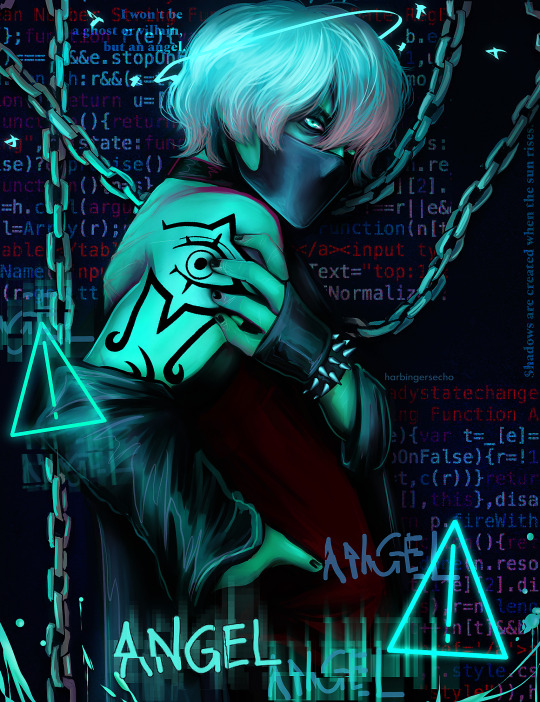
I don't feel pain
I never escape
I'm under the bed
I'm licking the floor
#mysmes#mystic messenger#mysme#mysme unknown#mysme saeran#saeran choi#mine#*24#art#unknown#this song is literally called weakling. sooo saeran coded.#half of this was just me trying to get the skin indents from gripping his bicep right. and its still not that good but i tried#whatever i miss this cunt.this fucker was everything to me in 2016-2018 you dont understand. teenage me 🫂 saeran#dont talk to me abt his route i have many conlicting feelings abt it. but i will say his overall portrayal was better in v's route than his#except near the end but even the conclusion to that was like. hm. he just wakes up and is fine. ok.#also why the split personality. bpd saeran was amazing that was even his VA's hc for him in SE. ok i said i wasnt gonna talk abt it IM NOT#... i just think they made him a less interesting ch in his route by splitting him up to a 'good'/'bad' side. like ray WAS manipulative#he's complex! he has a skewed world view + morals and a fucked up sense of self and major black and white thinking#ohh my god im not doing this again im not writing a dissertion in tumblr tags again. its an otome game with a nonsensical timeline
104 notes
·
View notes
Text
always fun to see people confidently say sth they think is universal when it absolutely isnt
"no one wants to play a game and look at an old hag all the time"
I would LOVE to play an old hag actually; having to look at vacuum sealed body suits on the most blandest pretty hot girl that walks in the most unhinged way possible to draw attention to her ass while she makes cutesy moaning sounds everytime she gets vaguely hurt on the other hand physically hurts me
#ganondoodles talks#random#yeas i saw someone actually say that#yes im rambling about it here bc i dont need 400 people in a livestream going after me#bc i find certain industry standards outright nausea inducing by how overdone and boring it is#and how much of a non problem that is to the majority of people#once you start paying attention to it you cant unsee it- ever realize that in 99% of games there is not a single fat character???
177 notes
·
View notes
Text


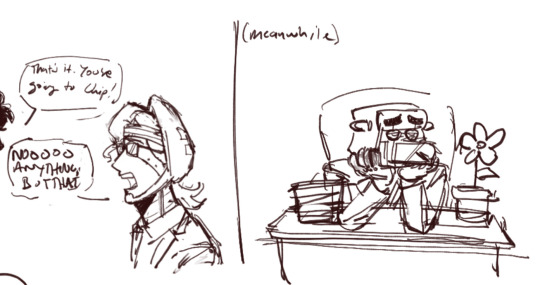
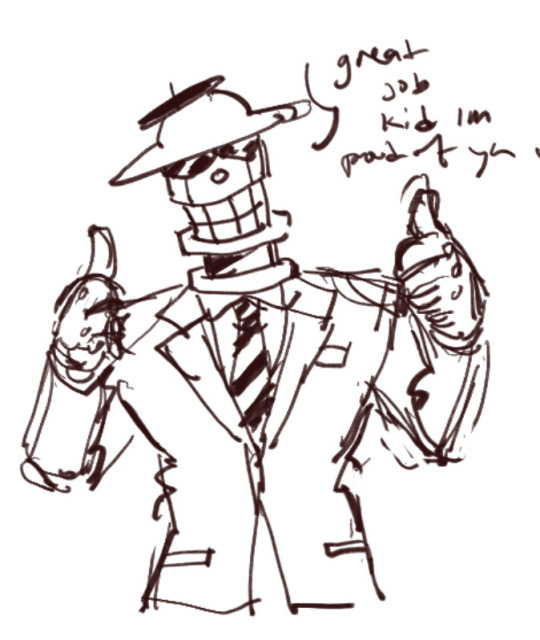

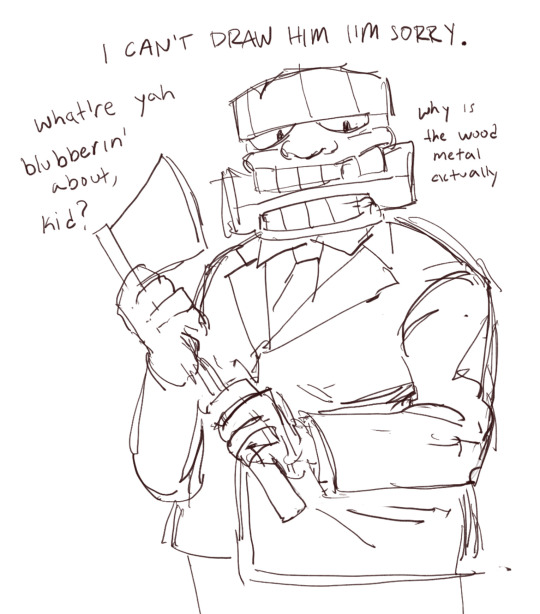
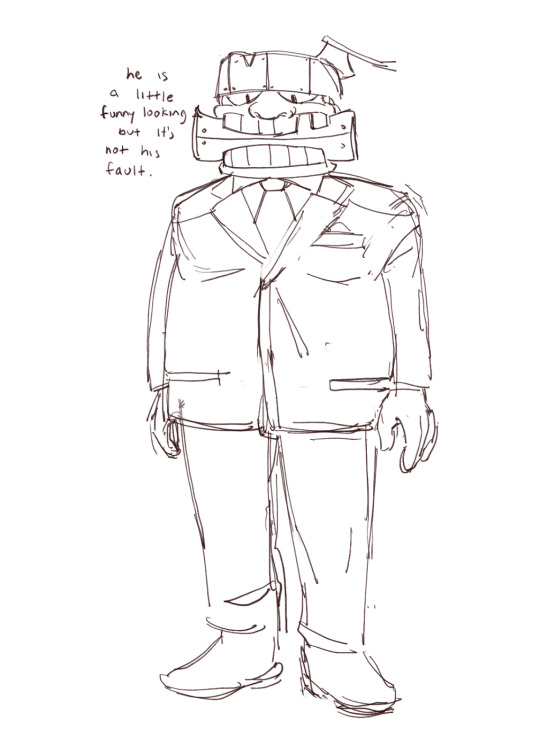

Bunch of doodles from last night, Chip has this specific look in my head
#toontown#ttcc#toontown corporate clash#Okay guys y'ready for the amount of tags im about t#treekiller#spruce campbell#chainsaw consultant#chip revvington#major player#dave brubot#pacesetter#graham payser#graham Ness payser#derrick man#william boar#*Panting as i leave the trenches#anyway the specific look im talking about is mainly regarding Chip's suit#which is double-breasted and also has Three pockets (I literally don't know why. He Just Does.)#Anyway. Enjoy. I didn't mean to die again back there
281 notes
·
View notes
Text
it is so painfully obvious that white gays have never been oppressed or marginalized outside of their queerness. y’all see Mizu, a woman marginalized into hiding her gender for her own safety and you think it’s a story about you. You’ve never been discriminated against as a woman of color. All the people on this site that I have seen saying the same things as me are other women or people of color, with few outliers, who understand what Mizu is going through.
I’m sorry that you’re starving for representation but so are we, if you want to project go watch Nimona or Our Flag Means Death. If you want to understand, you need to sit down and shut up.
if you think this is a story about a trans man you are missing the point
if you think this is a story about a man you are missing the point
#media as a window and a mirror. Blue eye samurai is a window for y’all you are on the outside looking in#blue eye samurai#mizu blue eye samurai#women of color#fandom racism#racism#that’s not even TALKING about how being biracial is a major part of the story#The people of her own culture aren’t accepting of her because she has parts of another#it is not a metaphor#I’m fucking biracial and bicultural I know what the hell im talking about
147 notes
·
View notes
Text
I’m already seeing male reactors get very verbally defensive about that scene in She-Hulk where Jennifer describes how, simply as a woman, she has more experience in suppressing rage than Banner because speaking out will get you labelled “hysterical”, “emotional”, “difficult”, “too much of a feminist”, the list goes on. And if you snap back at the wrong cat-caller, you can get murdered. So now mcu bros are rushing at the opportunity to cry out “this is just another ‘marvel throwing in another woke scene for woke’s sake’. But like...it isn’t untrue. Comic nerds are all for female superhero protagonists until she, god forbids, talks about the dynamics of what it’s like to live within the confines of patriarchy.
MCU fans are always clamoring for the social commentary to be more “subtle” and not so “in-your-face”, just so they can mindlessly enjoy a punchy fighty show and not have to confront any real-world intersections with racism, misogyny, xenophobia, transphobia, all the -isms and -phobias you can imagine. Additionally, even when the social criticisms are embedded into the story, the conflicts are routinely either overlooked or watered-down and discussed at the individual-level as if these are just isolated incidents and not reflective of larger phenomena. Dudebros forget that superhero comic media, from the very beginning, has always been political. A lot of the mainstream characters we know and love today were created in response to the anti-war and peace movements during the seventies in the United States (this is also not to say that there isn’t some definite war propaganda and Red Scare-inspired comics out there either).
Comics are teaching grounds for morality, human good, and bad, power, greed, corruption. Comics have been about the social commentary from the get-go. The idea that the government (and by extent society at large) is villainizing and surveilling a specific minority group who carry varying physical and genetic traits contrasting to that of the “ideal national subject” because of a perceived inherent aggression or difference based on their physical attributes *ahem ahem mutants*...where do you think they got that from?
I literally sat through a dude being like “IN MY EXPERIENCE AS A MAN, THAT IS NEVER THE CASE! IF A WOMAN GETS UPSET AND MAKES A SCENE IN PUBLIC, THE MAN ALWAYS LOOKS LIKE THE BAD GUY BECAUSE IT IS ASSUMED HE DID SOMETHING WRONG. MEN ARE THE ONES WHO CAN NEVER BE ANGRY.” (Obviously for Black men, my argument is different because when Black men express rage, they are viewed as a threat or turned into spectacle, but the person who made this rant was not a Black man, nor was he factoring race into his argument). As if masculinity and gratuitous violence have not become nearly synonymous. When male celebrities are accused of beating their partners, fans run to their defense to say “well she shouldn’t have provoked him.” When Will Smith slapped Chris Rock, the internet rooted for a televised boxing match between the actors/comedians. We all watched the Trump and Hillary debates right, where his belligerent behavior was coddled while she had to maintain composure?
We’ve collectively grown up watching male newscasters, talk show hosts, and reporters make jokes about angry women in sports, in the media or in news reports being on their periods, as a way to minimize the stressful and abusive circumstances, or people, women are subjected to. The world expects women to react to harassment with class and elegance; women’s anger, Black women especially, is never not mitigated. For male fans to come away from that scene wanting to eye roll is why the commentary is so “in-your-face” because a lot of y’all still don’t get it! Men are still finding ways to make women’s issues about them and the “loss” of their rights. In a world where Brock Turners are able to walk free, are you really trying to argue against this scene? Really? What else do you expect out of a series whose main character is AN ATTORNEY? Y’all are just not going to enjoy this series then, as per usual.
#if you're wondering who the youtuber in question is it is jaby koay from the channel#getjaby#he also has another channel but im not trying to promote his shit#he does reactions to loads of things but i literally want to beat his ass everytime he opens his mouth to make some social hot take bc#you might as well be talking to fucking ricky gervais#he gives major centrist vibes nd he's so fucking condescending nd will jump at any opportunity to mansplain things to his female co-reactor#he's like i'm woke but only to a certain point#anyways fuck dudebros#also are we gonna act like this she hulk scene is more shoe-horned in than that scene in endgame? let's be real#just say you hate hearing about any issues that affects anyone ever who isn't a white man#she hulk#she-hulk#marvel#mcu#mcu rant#tatiana maslany#jennifer walters#hulk#bruce banner#reactors
1K notes
·
View notes